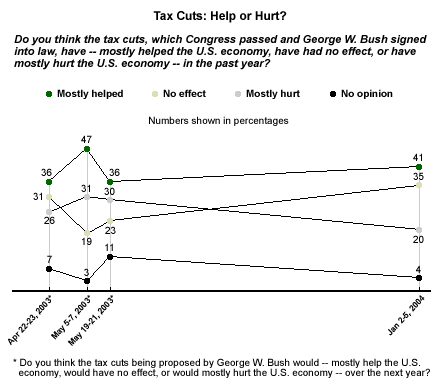During the first half of last year, there was a great deal of debate about the need for federal tax cuts and their potential impact on the economy. The debate took many forms. Some argued that federal government spending, not tax cuts, was the best way to provide a fiscal stimulus. Others debated the type of tax cut that should be enacted, suggesting that more of the benefit distribution should be shifted from one population group or business sector to another, more deserving group or sector.
On May 28, 2003, President Bush signed the Jobs and Growth Tax Relief Reconciliation Act of 2003. It seems reasonable now to ask whether the passage of this $1.3-trillion cut has achieved its objectives. Did the tax cut succeed in jump-starting the economy, as its supporters said it would? And more importantly from a political perspective, do the American people believe that cutting taxes has helped or hurt the U.S. economy?
Perceptions Haven't Really Changed
As the tax cut debate raged last spring, Gallup's polling showed that somewhere between a third and a half of the public thought the proposed cuts would benefit the economy. Just before the bill passed in mid-May, 36% of Americans said they thought the tax cut would mostly help the economy, while 30% said they thought it would mostly hurt. In a Jan. 2-5, 2004, poll*, 41% of the public believes the tax cuts have mostly helped the economy, and 20% believes the cuts have mostly hurt.

Have the Tax Cuts Worked?
Overall, the tax cuts have not received the credit they deserve for their success in the immediate term. Clearly, the tax cut stimulus has combined with accommodative monetary policy to jump-start the first real economic recovery since Sept. 11. Regardless of the distribution effects resulting from last year's tax cut package, the short-term benefits can be seen in the strengthening equity markets, increased capital spending, and strong consumer spending. In this context, last year's tax cuts have significantly benefited the U.S. economy.
So why do three in five Americans say that the tax cuts have had no effect or even hurt the economy? In part, this attitude may result from confusion between the immediate positive impact of the cuts and the potential for some negatives in the long term. Many people fear a longer-term negative impact coming from increasing deficits and the declining dollar, and they still believe that this overall long-term negative impact will outweigh any short-term benefits.
More likely, however, the lack of appreciation for the effectiveness of the tax cuts on the part of many Americans has to do with the "jobless" nature of the current economic recovery. Only real job growth will convince America that the recent federal tax cuts were beneficial, and that additional tax cuts are a good idea. So far, this objective of the tax cuts has yet to be realized.
*Results are based on telephone interviews with 1,029 respondents, aged 18 and older, conducted Jan. 2-5, 2004. For results based on these total samples, one can say with 95% confidence that the margin of sampling error is ±3 percentage points.
